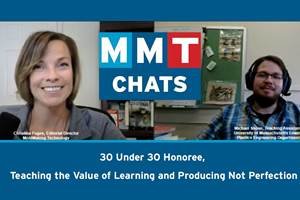In-House Training Fosters Future Moldmaking Industry Leaders
R&D/Leverage shares its workforce development strategies, which include structured, hands-on training and a little old-fashioned work ethic.
R&D/Leverage in Lee’s Summit, Missouri, has successfully trained eight apprentices since starting its formal, four-year program in 2011 and has seven active apprentices today. The company specializes in all aspects of moldmaking. The group focuses on injection stretch blow molds (ISBM), injection blow molds (IBM) and injection molds for customers in the home and personal care, food and beverage and healthcare and medical industries. It has 252 employees working within seven buildings that offer 260,000 square feet of manufacturing floor space spread out over its 12-acre campus.
Chris Lavery, vice president of manufacturing, says R&D/Leverage seeks apprentice candidates who possess specific qualities. “Since we already know the candidates have no experience, we look for other qualities during the interview process. We look for a positive attitude, good character traits, hobbies such as wood working or auto mechanics, references from any training programs, teachers, neighbors, coaches and R&D employees etc. and a good score on a mechanical aptitude test. We know that if a candidate presents well with these qualifications, we can teach him or her the skills and knowledge he or she will need to be successful,” Lavery says.
The machinist apprenticeship program at R&D, which Lavery oversees with the assistance of shop foreman Jim Martin, team leaders and senior-level machinist mentors, is a structured, four-year (or 8,320-hour) training program that covers all aspects of the machinist trade. The company designed the training program around the moldmaking and tool making trades to support the company and the industry, he says. On-the-job training at R&D requires one machinist apprentice to work with one senior-level machinist while on the shop floor to ensure that the apprentice completes the work safely and as required. Additionally, the program requires each apprentice to purchase and maintain the basic set of tools, including calipers, micrometers, a calculator, Allen wrenches in English and metric sizes, depth micrometers and a six-inch scale.
To ensure that apprentices become well-versed in the theory and practice of skilled machining, the R&D/Leverage apprenticeship program schedule requires approximately six months training in each of the following areas: CNC mills, CNC lathe, wire EDM, hard milling, ID/OD grinding and hard turning. During each of these steps apprentices learn about safety, preventive maintenance, inspection techniques, set-up and operation of the various machines. Apprentices then spend 12 months learning skills directly applied to moldmaking. They spend about three months on each relevant area including engine lathe, manual milling, surface grinding and bench work. Mentors like Lonnie Wise, who is a senior toolmaker, work closely with apprentices through these steps. “With the apprentices, it’s very important to set expectations. You don’t know what kind of home life they have had or who has been mentoring them or whether anyone has even talked to them about the keys to success,” Wise says. “We set expectations, tell them to do their best and that we’re here to support them. They are taking the first step of a tremendous journey that will give them a rewarding career and enable them to support a family, which is very important.” Lavery also says that there are no shortcuts for trainees where Wise is concerned. “He’s not just training them on how to set up and run a Bridgeport or a surface grinder, or how to do the math long-hand, though he will sit them down with a piece of paper and teach them old-school ways. He’s also teaching them important work ethics, which we’ve missed a lot of with this next generation—and that’s a fact. When he tells you to be here at 7 a.m., you better be here at 7 a.m. If he wants you to stay late to finish a job, you will do it.”
Apprentices also spend time in the company’s stretch-blow lab, where they learn about tool setup and installation, molding machine operation, PET materials and processing, bottle inspection techniques and more. The program keeps detailed records of every element that apprentices learn, and the program evaluates apprentices in 90-day intervals to determine if they are ready to advance to the next training segment. Upon completion, apprentices receive an R&D Certificate of Completion for the machinist apprenticeship program.
The company is active in many programs and organizations like the National Tooling and Machining Association (NTMA). Lavery says, “We are a member of the NTMA, and we use all their training programs to help structure our internal programs as well as for recruiting interns and full-time employees.” Other organizations with which R&D participates include the American Mold Builders Association (AMBA), Kansas City Manufacturing Network (KCMN), Metropolitan Community College of Greater Kansas City (MCCKC), Kansas City Kansas Community College (KCKCC), local high school robotics programs, college programs like the Missouri Innovation Campus and the company’s grassroots efforts with Support Plastics USA. “We participate in local job fairs as well as offer campus tours to high schools and colleges. I only see this getting better with time,” Lavery says. “As more attention to the skills gap grows through social media, supporting organizations and in continual articles in publications like MoldMaking Technology, the word is getting out about how great this trade can be for a career path.”
Related Content
ICYMI, MMT Chats: 30 Under 30 Honoree, Plastics Engineering TA Teaches Value of Learning and Producing Not Perfection
MoldMaking Technology Editorial Director Christina Fuges brings on UMass Lowell Plastics Engineering Teaching Assistant Michael Shone as a guest for this MMT Chat to discuss moldmaking through the lens of academia. This episode is brought to you by ISCAR with New Ideas for Machining Intelligently.
Read MoreThe Role of Social Media in Manufacturing
Charles Daniels CFO of Wepco Plastics shares insights on the role of social media in manufacturing, how to improve the “business” side of a small mold shop and continually developing culture.
Read MoreTackling a Mold Designer Shortage
Survey findings reveal a shortage of skilled mold designers and engineers in the moldmaking community, calling for intervention through educational programs and exploration of training alternatives while seeking input from those who have addressed the issue successfully.
Read MoreHands-on Workshop Teaches Mold Maintenance Process
Intensive workshop teaches the process of mold maintenance to help put an end to the firefighting culture of many toolrooms.
Read MoreRead Next
How to Use Strategic Planning Tools, Data to Manage the Human Side of Business
Q&A with Marion Wells, MMT EAB member and founder of Human Asset Management.
Read MoreReasons to Use Fiber Lasers for Mold Cleaning
Fiber lasers offer a simplicity, speed, control and portability, minimizing mold cleaning risks.
Read MoreHow to Use Continuing Education to Remain Competitive in Moldmaking
Continued training helps moldmakers make tooling decisions and properly use the latest cutting tool to efficiently machine high-quality molds.
Read More







.jpg;maxWidth=300;quality=90)


















